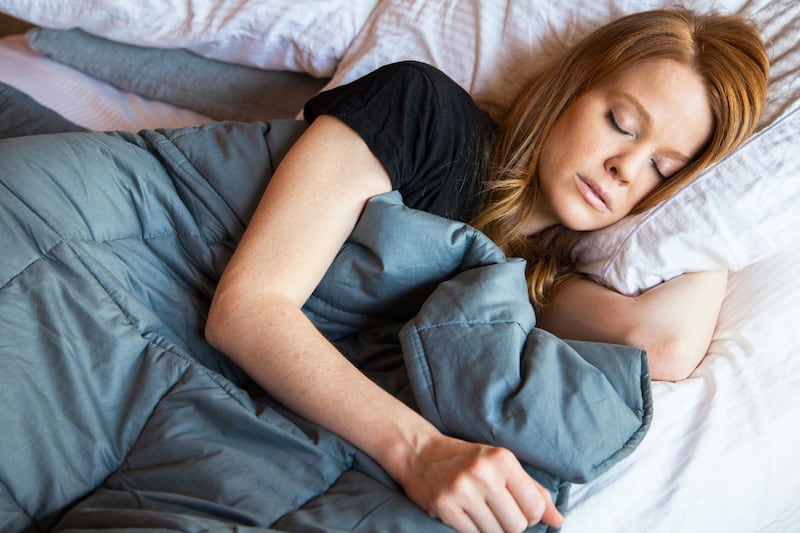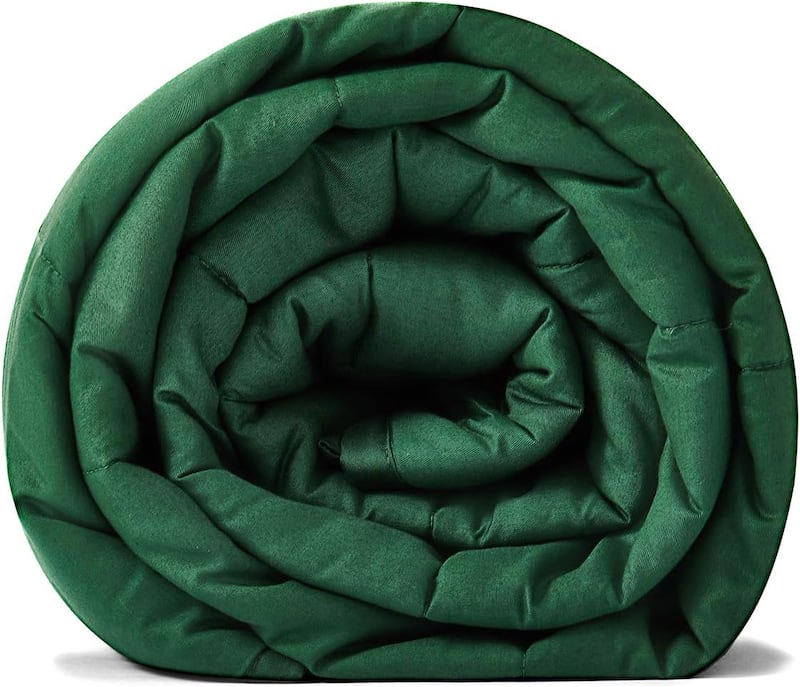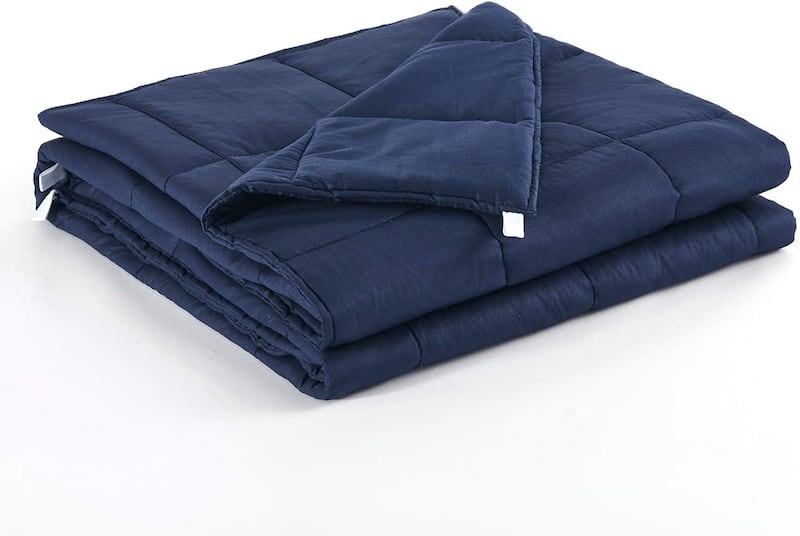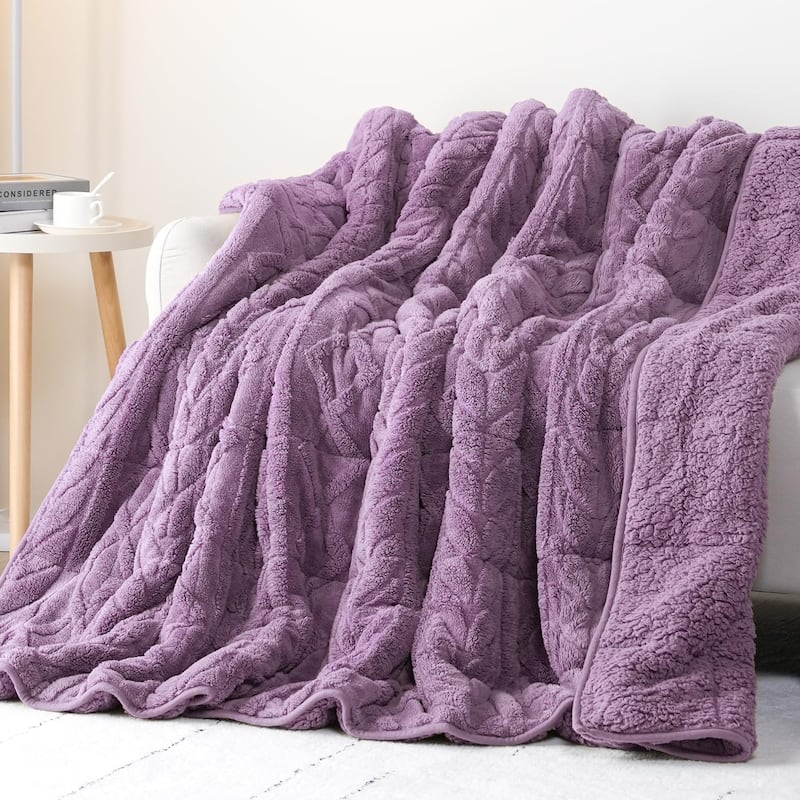Life’s daily trials and tribulations often don’t stop just because you walk through your front door after a long, exhausting day at work. The stress and anxiety that come with simply being human add an extra layer of worry, often making it hard to enjoy well-deserved rest and relaxation. We all feel weighed down now and then. (Get it?)
Whether your end-of-day routine involves pouring a large glass of wine while getting cozy on the couch or simply diving straight into bed, weighted blankets might be the extra touch you need to add to your end-of-day decompression routine.
That said, weighted blankets are not recommended for everyone, and they certainly aren’t the cure-all panacea for sleep conditions that some brands and influencers tout them to be. In fact, they can sometimes make existing concerns even worse.
What is a weighted blanket, and how does it work?
These textiles, which gained mainstream popularity in the late 2010s but have been counted on by people with disabilities for far longer, are more than just a simple duvet cover or particularly thick comforter. While weighted blankets bring the same comforting satisfaction of warmth and coziness, they come with a unique touch. Weighted blankets are filled with plastic pellets, pebbles, sand, or beads, evenly distributed in pockets within the fabric to provide weight. They come in various lengths, styles, and weights, usually ranging from five pounds up to a hefty 30 or even 40 pounds.
Weighted blankets are often used to alleviate stress and anxiety by applying pressure to the user’s body, according to Julie Kolzet, a consultant and licensed psychologist in New York City who specializes in behavioral sleep medicine. This pressure induces a calming effect on the nervous system.
“This type of tactile stimulation input may lower arousal, reduce sympathetic nervous system activity,” Kolzet tells The Daily Beast. She suggests the sensation of lying under the blanket as feeling like a warm hug—creating a sense of safety and calm, similar to an embrace from a spouse or friend. According to Kolziet, the weight of the blanket is often most therapeutic to individuals with sensory processing sensitivities, commonly linked to autism spectrum disorder (ASD) or attention-deficit/hyperactivity disorder (ADHD), as well as those experiencing generalized anxiety or insomnia related to hyperarousal.

A blanket with benefits
Weighted blankets have also been linked to the potential to enhance sleep quality. However, there is limited research to confirm these blankets as the definitive solution. “If you have a good deal of anxiety, it can be useful for some people to calm their anxiety, therefore allowing them to set the stage for sleep,” says Shelby Harris, a licensed psychologist in New York City who specializes in behavioral sleep medicine and cognitive-behavioral therapy.
Comfort has its pros and cons—especially when it comes to fighting the urge to snooze the alarm a few more times before unwrapping yourself from the covers and getting ready for work. Dr. Harris says feedback from individuals who use the blanket varies. “Some people love it, others find that it just makes them warmer, and it makes it harder for them to get out of bed,” Dr. Harris told The Daily Beast.
Which health conditions can worsen under weighted blankets?
A weighted blanket is not suitable for everyone, nor can it guarantee a good night’s sleep while completely eliminating any specific concerns or pain points.
“While overall it may improve the quality of sleep, I do not think it could benefit people with underlying respiratory conditions,” says Rohan Mankikar, a pulmonologist and clinical instructor of medicine for NYU Langone Health at NYU Langone Health.
For individuals with underlying respiratory conditions, such as asthma, COPD, and sleep apnea, weighted blankets may restrict airflow. Dr. Mankikar notes that this can exacerbate symptoms due to the added weight on the chest.
Certain mental health–related symptoms or conditions, too, may preclude prospective users from finding solace and comfort under a weighted blanket. According to Dr. Kolzet, those diagnosed with panic attacks or who experience claustrophobia should avoid using a weighted blanket because it might increase anxiety by feeling restricted. She also mentions that a weighted blanket should weigh about 10 percent of a person’s body weight and should never be used on children under two due to the risk of suffocation.
The verdict on weighted blankets
While weighted blankets can (and do) provide a soothing benefit to many who struggle with sleep issues or anxiety, they are not a universal solution and should be approached with care. “They can help some people, but they’re not a panacea,” says Dr. Kolzet. “Maybe they offer people comfort, and comfort is a good thing, but it’s not a clinical tool.”
In other words, just because eight people on your Instagram, TikTok, or Facebook feed swear their blankets fixed this issue or that problem, we still encourage you to do independent research and, if possible, to consult with your physician before adding anything weighted to your sleep routine. But if they do help you
Recommendations from weighted blanket fans
With all the basics out of the way, let’s talk recommendations from people who do love their weighted blankets.

Tongdada California King Size Weighted Blanket in Dark Green ($112, Amazon)
Why it’s good: “I absolutely love my weighted blanket—it’s heaven to me,” says Claudia Lindgren, a University of Missouri psychology student who initially purchased a weighted blanket to help ease her anxiety and panic attacks. Lingren describes her 40-pound Tongdada California King Size Weighted Blanket as feeling like a warm hug that serves as a grounding tool whenever she starts to feel overwhelmed. “I think everyone should try a weighted blanket,” Lindgren notes. “Neurotypical or not, it’s a sensory experience that’s truly unmatched.”

RelaxBlanket King Size Weighted Blanket in Navy ($90, Amazon)
Why it’s good: Amber Levis, a reporter at The Daily Beast, says she has become a fan of weighted blankets after receiving a 30-pound one similar to this option from RelaxBlanket. “I like it, but I can’t really use it unless it’s wintertime because it gets too hot,” says Levis, who notes that the blanket can be somewhat challenging to clean due to its size. “I have insomnia problems, so I also think it helps me sleep better.”

Cottonblue 15-Pound Weighted Blanket in Jacquard Purple ($80, Amazon)
Why it’s good: Helena Murphy, a marketing intern at BBDO Worldwide in Chicago, IL, says her Cottonblue Weighted Blanket brings her comfort both during the day and at night. “It totally changes the experience of an afternoon nap or going to sleep at night,” says Murphy. “There’s something about the heaviness that is so cozy and relaxing, it immediately puts me to sleep.”
The post Some People Should Never Use a Weighted Blanket—Are You One of Them? appeared first on The Daily Beast.




